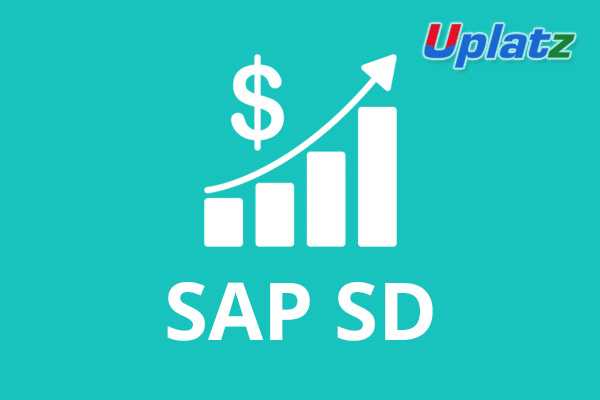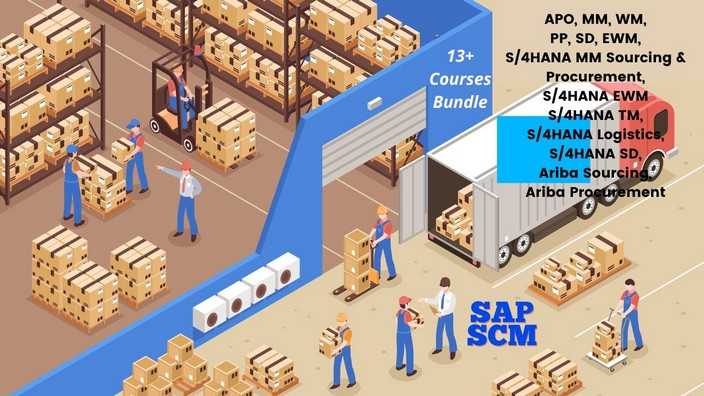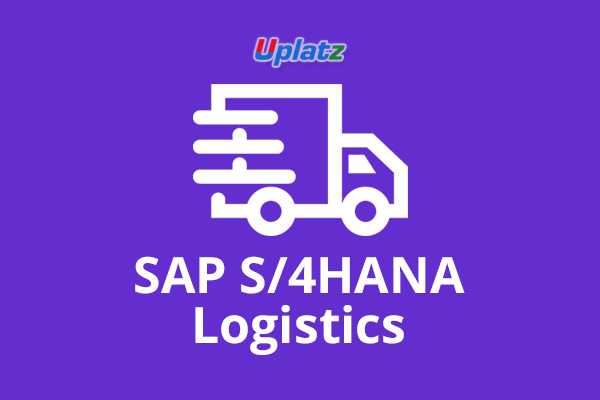SAP PS (Project System)
Learn SAP PS module - Business Processes, Work Breakdown, Activities, Network, Project Structures, Planning and Forecasting. Become SAP PS Consultant.Preview SAP PS (Project System) course
View Course Curriculum Price Match Guarantee Full Lifetime Access Access on any Device Technical Support Secure Checkout Course Completion Certificate 38% Started a new career
BUY THIS COURSE (GBP 29)
38% Started a new career
BUY THIS COURSE (GBP 29)
-
 73% Got a pay increase and promotion
73% Got a pay increase and promotion
Students also bought -
-

- SAP SD (Sales and Distribution)
- 25 Hours
- GBP 29
- 195 Learners
-

- Bundle Course - SAP SCM (Supply Chain Management)
- 140 Hours
- GBP 22
- 3351 Learners
-

- SAP S/4HANA Logistics
- 32 Hours
- GBP 29
- 1643 Learners

SAP PS (Project System) is an integrated project management tool provided by SAP that monitors all aspects of your project and other SAP application components.
SAP PS ensures that the organization’s business processes are handled efficiently and quickly. It can handle both small scale and large scale projects. SAP PS performs project and portfolio management and helps you to manage the project life cycle starting from structuring to planning, execution, until the project completion. SAP PS module helps to manage and support all the SAP projects in a company and is a source to organization for planning, scheduling, collecting, and generating revenue and expenditure over a project period.
SAP PS is one of the important modules of ERP SAP system that helps an organization to record, monitor and track all aspects of project. SAP Project systems is a project management tool that assist you planning and managing projects throughout all project system and other SAP application components such as procurement, logistics execution, SAP financial, SAP HR, etc. The high degree of integration between the Project System (PS) and other R/3 application components means that you can plan, execute, and account for projects as part of your normal commercial procedures.
The important components of SAP PS module are: Structures, Cost, Dates, Resources, Materials – MRP, BOM, Project Versions. SAP PS is the application that all departments involved with a given project will use to control the project in its entirety. The Project System has no organizational structures of its own; you incorporate it into the existing structure by making assignments to the organizational units.
Key features of SAP PS module include:
1. Project Planning: SAP PS enables users to create and define project structures, including work breakdown structures (WBS), networks, activities, and milestones. Project planning involves setting up project timelines, resource allocations, and cost estimates.
2. Resource Management: Users can assign resources such as manpower, equipment, and materials to project activities. SAP PS helps optimize resource utilization by tracking resource availability, capacities, and allocations across multiple projects.
3. Cost Management: SAP PS facilitates cost planning, budgeting, and tracking for projects. It allows users to define project budgets, allocate costs to project activities, monitor actual costs incurred, and compare them against planned costs.
4. Project Execution: SAP PS supports project execution by providing tools for task management, progress tracking, and issue resolution. Users can record actual work performed, update project status, and manage changes to project schedules and resources.
5. Integration with Financials: SAP PS integrates seamlessly with SAP FI and SAP CO modules for financial accounting and controlling aspects of projects. It enables cost accounting, revenue recognition, profitability analysis, and variance analysis for projects.
6. Project Reporting and Analytics: SAP PS offers reporting and analytics capabilities to monitor project performance, track key metrics, and generate various reports such as project status reports, resource utilization reports, cost variance reports, and milestone reports.
6. Integration with other SAP Modules: SAP PS integrates with other SAP modules such as SAP MM for materials procurement, SAP SD for sales orders and deliveries, and SAP HR for resource management. This ensures consistency and data integrity across different business processes.
7. Project Portfolio Management (PPM): SAP PS supports project portfolio management by allowing organizations to prioritize, evaluate, and select projects based on strategic objectives, resource constraints, and financial considerations.
This SAP PS training by Uplatz covers the necessary certification topics for SAP PS. It includes SAP PS Business Processes, Work Breakdown, Activities, Network, Project Structures, Planning and Forecasting. In this SAP PS course you will also learn configuration which covers PS Organisational data, Master Data, processing Transaction data, Integration and Reporting. You can learn detailed information of project systems components with configuration steps in this SAP PS course.
SAP PS training enables you to maintain project-related operations in SAP like reporting, billing, exaction, panning, etc. It helps you handle the project using its complete life cycle, from designing detailed plans to establishing a structure to running and finishing a project. Our real-world scenarios and projects will provide you hands-on knowledge of versions, PS texts, customer projects, documents, scheduling with networks, availability check, cost planning, original budget, milestones actual dates, budget release, timesheet entry, collective confirmation, individual confirmation, and external processing services. Along with these, you will also master materials management, Sales, Financing, hierarchy reports, and cost element reports. Join our SAP PS online training to become a certified SAP PS Consultant.
Course/Topic - SAP PS - all lectures
-
Lecture 1 - Organization Structure Configuration
-
Lecture 2 - Misc Configuration
-
Lecture 3 - Investment Profile Configuration
-
Lecture 4 - Project Profile Configuration - part 1
-
Lecture 5 - Project Profile Configuration - part 2
-
Lecture 6 - Status Profile Configuration
-
Lecture 7 - Coding Mask Configuration
-
Lecture 8 - Settlement Configuration
-
Lecture 9 - Substitution
-
Lecture 10 - Validation
-
Lecture 11 - Scheduling
-
Lecture 12 - Project Planning Board
-
Lecture 13 - Cost Planning
-
Lecture 14 - SAP PS Budget - part 1
-
Lecture 15 - SAP PS Budget - part 2
-
Lecture 16 - Confirmation
-
Lecture 17 - Material Procurement - part 1
-
Lecture 18 - Material Procurement - part 2
-
Lecture 19 - Milestone Configuration
-
Lecture 20 - Progress Analysis
-
Lecture 21 - Timesheet - PS and HR Integration
-
Lecture 22 - Appropriation Request
-
Lecture 23 - Investment Program
-
Lecture 24 - Network and Activity Configuration - part 1
-
Lecture 25 - Network and Activity Configuration - part 2
-
Lecture 26 - Project Template
-
Lecture 27 - PS and IM Integration - part 1
-
Lecture 28 - PS and IM Integration - part 2
-
Lecture 29 - PS and SD Integration
-
Lecture 30 - End to End Process Flow - part 1
-
Lecture 31 - End to End Process Flow - part 2
-
Lecture 32 - End to End Process Flow - part 3
-
Lecture 33 - End to End Process Flow - part 4
-
Lecture 34 - SAP PS Tcode
-
Lecture 35 - SAP PS Tables and Table Report
-
Lecture 36 - Data Migration
• Overall and detailed cost planning
• Cost element and revenue planning
• Copy actual/plan
• Apply overhead and interest
• Conceptual knowledge of integration with SAP PM, PPM, CPM, ReFx
• Conceptual knowledge of EPC (Integration with MSP and P6)
• Process training of SAP PS best practice scenarios (Investment Project, Customer Project, Cost Project and Outage Project) including all necessary settings in cross modules.
• Implementation approach of SAP Project system, required note implementation.
• Learn how to prepare BBP, FS, UT, IT and UAT documents.
• Covering all the Contents of SAP PS certification (PLM200, PLM210, PLM220, PLM230, PLM235 and PLM240)
What will you learn in SAP PS course:
1) Basic concepts of SAP project system module.
2) How to implement SAP R/3 PS module step by step with screen shots.
3) Real time scenarios based on projects.
4) Real time issues and errors with solutions.
5) Top PS interview questions that asked in various companies.
6) SAP certification guide
7) How to integrate PS module with other SAP modules.
8) Case studies on SAP project system module.
1. Introduction to PS Module
2. Types of Projects
- Investment Projects
- Customer Projects
3. Project Structures:
- Project Definition
- Work breakdown structures
- Networks
- Activities
- Milestones
- Standard project structures(Templates)
4. Master Data for PS
- Work enters
- Activity Types
- Cost enter
- Cost Elements
- Statistical Key figure
5. Project Planning
Cost Planning
- Resource Planning
- Material Planning
- Bill of Material (BOM)
- Other Costs Planning
- External Services Planning
Easy Cost Planning
Scheduling
- Bottom-up Scheduling
- Top-Down Scheduling
Capacity planning and workforce planning
Budgeting
Revenue planning
- Sales Order Account Assignment
- Resource Related Billing
- Miles Stones
6. Project Execution
- Material procurement Process
- Resource Cost Confirmation
7. Delivery from projects
8. Information Systems
- Project Structure Reports
- Actual/Cost Variance Reports
- Material Components Reports
- Cost Report
- Project Results Reports
- Other Reports
9. Period-end closing
- Results Analysis
- Settlement
- Closing of Projects
10. Other Integration Scenarios
- Cross Application Time Sheets(CATS)
- Open PS
- MRP (Material Resource Planning)
This SAP PS training course is designed to help you crack the SAP Certified Application Associate - SAP Project System with SAP ERP 6.0 EhP7 exam.
In the SAP PS course the participants learn about the project life cycle management. You will also learn about PS key module which is used for project and portfolio management. This seems to be an essential learning for all SAP PS module users.
SAP PS Certification is an important benchmark in becoming a SAP PS Associate as the exam topics cover project structures, material, resources and reporting. SAP PS tutorial helps the participants to learn about project management entire process and thus attaining a unique SAP certification. SAP PS course offers complete information about the SAP Project Planning processes thus making the participant a skilled SAP PS Consultant.
Uplatz's SAP PS self-paced training course facilitates the participants to successfully go through the SAP PS concepts provided by SAP. Uplatz provides appropriate teaching and expert training to equip the participants with skills to implement the learnt concepts in an organization.
Course Completion Certificate will be awarded by Uplatz upon the completion of the SAP PS course.
The SAP PS certification exam verifies that the participants possess basic knowledge and can prove their skills in the area of SAP Project system. This SAP PS certification exam validates that the participant has an overall understanding about this consultant profile, and able to implement the knowledge practically in projects.
Below given are the certification details of SAP Certified Application Associate - SAP Project system with SAP ERP 6.0 EhP7 exam:
· Certification Level: Associate
· Exam Name: SAP Certified Application Associate- SAP Project System with SAP ERP 6.0 EhP7
· Exam Code: C_TPLM22_67
· Exam Mode: Online
· Total Number of Questions: 80
· Pass Score: 55%
· Time Duration: 180 Minutes
· Exam fee: $550
The SAP PS Consultant draws an average salary of $123,015 per year depending on the knowledge and hands-on experience. The SAP PS Consultant job roles are in high demand and make a rewarding career.
The SAP PS Consultants are recognized across the globe. The increased usage of the Project management in many companies help the participants to find a job opportunity easily. The leading companies hire SAP PS Consultant considering the efficiency in project planning and management.
The learners earn most beneficial SAP PS certification through our expert training and course curriculum. Being SAP PS certified is definitely valuable credential and adds value to every organization.
The SAP PS certification is targeted to those who are beginners, managers, PLM and business consulting background and excel in project management area.
The following are the job titles:
· SAP PS Associate
· SAP PS Consultant
· SAP PS Developer
· SAP PS Functional Consultant
· SAP Project Consultant
The SAP PS certification program helps the participants to get placed in reputed MNCs and organizations.









